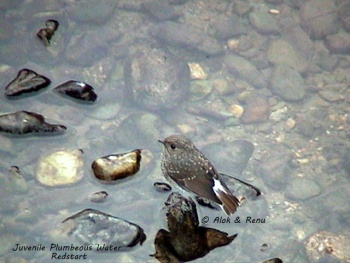Alternative name: Plumbeous Redstart

Photo © by Alok Tewari
River Shipra, Dist. Nainital, Alt. 4500 ft., Uttarakhand Himalayas, India, 17 April 2015
- Phoenicurus fuliginosa
Phoenicurus fuliginosus Rhyacornis fuliginosa
Identification
12-14 cm (4¾-5½ in), 13-23 g. Strong sexual dimorphism
Male: tail, rump, and vent are reddish-rufous, the remainder of the plumage a rich, dark slate-blue.
Female: bases of outer tail feathers, rump, and vent white, remainder of tail black; grey above, pale eye-ring; wings black with white tips; throat, breast, and belly plumage white with dark feather edges, giving a strongly scaled appearance.
Both sexes have black bills, feet brown.
Similar Species
Male has a solid rufous tail, lacking the dark central tail feathers of most other redstart species. Female somewhat resembles Little Forktail, but the latter has a white crown and a white wing-band extending to the back.
Distribution

Photo © Alok Tewari
River Shipra, Dist. Nainital, Uttarakhand Himalayas, Alt. 4500 ft., India, 10 April 2008
Plumbeous redstart is found along Himalayas from Bhutan to Pakistan through Nepal and India, and further west in northeastern Afghanistan. It also occurs in Bangladesh, China, Taiwan, Laos, Myanmar, and Vietnam; have also been recorded in Russia and central Asia.
Taxonomy
Formerly placed in genus Rhyacornis.
Subspecies
Two subspecies are recognised[1]:
- P. f. fuliginosus from Pakistan east to India, Nepal, Bhutan, Burma, southeast Tibet, western China and to northern Vietnam
- P. f. affinis in Taiwan
Habitat
Almost exclusively found on fast-flowing alpine streams; an altitudinal migrant from 1000-4300 m. Perches on shrubs near stream, or on boulders in the water.
Behaviour
Usually abundant in suitable habitat. Both sexes flirt the tail often as they move from rock to rock in alpine streams, and territorial displays are frequent. Often found with dippers or White-capped Water-Redstart.
Diet
Their diet consists almost entirely of insects, particularly caddis flies and their larvae, mayflies and midges. They often hawk small insects from low perches on stones or shrubs. They will also eat berries and seeds occasionally.
Vocalisation
Song: a rapid metallic streee-treee-tree-treeeh, call note a sharp ziet, ziet.
References
- Clements, J. F., T. S. Schulenberg, M. J. Iliff, D. Roberson, T. A. Fredericks, B. L. Sullivan, and C. L. Wood. 2017. The eBird/Clements checklist of birds of the world: v2017, with updates to August 2017. Downloaded from http://www.birds.cornell.edu/clementschecklist/download/
- Avibase
- Handbook of the Birds of the World Alive (retrieved November 2015)
Recommended Citation
- BirdForum Opus contributors. (2025) Plumbeous Water Redstart. In: BirdForum, the forum for wild birds and birding. Retrieved 25 April 2025 from https://www.birdforum.net/opus/Plumbeous_Water_Redstart
External Links
GSearch checked for 2020 platform.1




